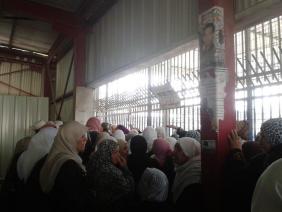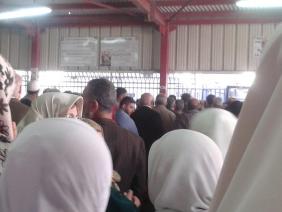Qalandiya
09:00 We arrive at Qalandiya. The parking lot is completely full and we have to park outside the checkpoint area. From a distance we could see crowds flowing to the crossing, on foot and in vehicles. Many transport vehicles in the parking lot.
The covered area is crowded. All lanes are open and masses of people are jammed before them – old people, men, women and children. The lines extend to the end of the covered area.
Unusually for Friday, the humanitarian lane is also open; women, the elderly and the ill are the main people crowded there. They’re not entering.
It’s been a long time since we’ve seen such congestion during our shift.
Many soldiers around the sealed building and between the fences.
A pair of cats wanders freely among the fences, between the soldiers’ legs, lolling in the sun.
09:15 An argument on one of the lines, someone’s trying to push to the front.
09:25 Even though all the lanes are open, many more people continue to arrive and the lines barely shorten. People wait on the outer line for about an hour.
09:30 I telephone the Qalandiya DCL. The guy who answers says they’re aware of the congestion so they opened all the crossings and the humanitarian lane.
A middle-aged man approaches us and says angrily, “Do something! Why don’t you do something?”
When the revolving gates open people start shouting, arguing loudly, and are shoved against the bars. The congestion doesn’t ease.
open people start shouting, arguing loudly, and are shoved against the bars. The congestion doesn’t ease.
09:35 We telephone Chana Barg who asks how many are at the checkpoint. Hundreds. Chana says she’ll do what she can, and she `does!
09:40 The gate opens in the humanitarian lane and the scene repeats – pushing shoving, being crushed. The lucky ones enter and the gate slams immediately in the face of the others.

The doors to the bathrooms are open. Up close, the filth and stench of the secretions are unbearable. Some of the compartments are so filthy it’s frightening. Feces covering the installation. A real danger to health. But, having no choice, the Palestinians use them. How did they manage all these years without bathrooms? Why isn’t there someone cleaning them on such a crowded day? Is there even running water?
When people are refused entry (like a man and his two children) they must push back through the crowd because there’s no other way.
An old man arrives, leaning on his cane. It’s clear he’s ill and can’t stand and push on line, even the supposed “humanitarian” line. He taps his cane on the fence to get the soldiers’ attention. The female soldier says she can’t let him through because the line is crowded and they won’t make way for him. And adds that if he’s sick he should go to the Ramallah hospital.
He remains standing on line.
10:00 The situation has improved slightly. A policeman arrives (we know him; he’s the one who doesn’t speak to us) and “organizes things” and makes the crossing go faster, first at the humanitarian lane, but he also controls the others.
When the revolving gate at the regular line opens many women run from the line at the closed humanitarian gate and try to push into the line where the revolving gate opened – inhuman yelling and shoving. An appendix forms to the main line.
A pair of female soldiers wearing combat boots, weapons draped over their shoulders, wanders slowly around, chatting calmly in the face of the crowded, loud and angry mass of people.
10:20 A girl is pushed against the fence in the corridor when everyone rushes forward to the revolving gate. When I cry to be careful of the girl, a Palestinian yells back, in English: “The problem is not here, the problem is there,” pointing to the building where the soldiers are.
10:25 The congestion decreases.
A man limping on both legs arrives stumbling, trying to run, quickly reach the humanitarian lane before the gate closes.
10:30 The lines have become much shorter. The humanitarian line has been “eliminated” and the gate closes.
The policeman did a good job. It’s too bad he didn’t do it much earlier.
